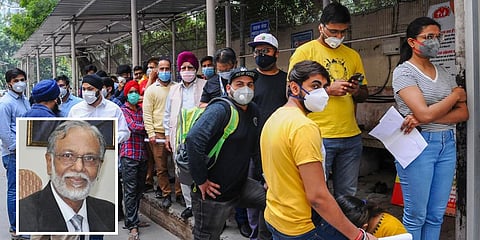

India saw a sharp spike in the number of coronavirus cases on Wednesday. With worries spreading, and theories too, The New Indian Express spoke to leading virologist Dr T Jacob John from the Christian Medical College, Vellore, to gain a better understanding. Excerpts from the interview:
The number of coronavirus cases in India is now spreading fast. How worried should we be?
There is no point in worrying because it won’t help anyone and create unnecessary panic. The point is that this virus came, like many others, from animals to humans and seems a good fit for human transmission —as the global trend shows. We will need to accept the fact that this is an uninvited but most likely a permanent guest. What governments can do and are doing is to fund preventive and curative options but obviously that will take time.
There are some theories that the virus does not multiply very fast beyond 26-27 degrees Celsius and therefore India being a hot country, its impact won’t be huge?
That, at the best, is wishful thinking without much scientific evidence. A drowning man clutches even a straw. If that were true, the virus would not have survived in Kerala in the first detected cases in the country. Singapore is also a considerably warm country and the case burden has been significantly high there as well. So I do not believe much in this temperature theory.
How do you rate India’s preparedness and approach so far in tackling the outbreak? In that context, how have we dealt with such outbreaks previously?
I think we did a fairly good job in tackling the H1N1 pandemic in 2009 initially and the same approach of screening high-risk groups and quarantining them has been adopted now. In the case of H1N1, the standard methods had definitely slowed down transmission. Let’s see how it goes from here in case of the coronavirus.
At the moment, we are testing samples from “suspected” people but remember—snakes are mostly found when one actively looks for them. It’s possible that the virus could slip into the communities undetected. COVID 19 could be a lot more challenging because symptoms are mild or not present at all initially in many infected people. So at this juncture, proper contact tracing of all confirmed cases is important.
But as it looks likely, if the numbers of cases go significantly high, it will be difficult to manage them because of our poor health management system. The fact is that H1N1 mortality in India is still considerably higher in India than in most developed countries.
It’s because our system tolerates the communicable disease burden and simple measures like making a law to ask all doctors to diagnose with lab reports serious communicable diseases and registering reasons for all pneumonia deaths are not in place. Many people in the country die of communicable disease without proper diagnosis and that’s an accepted norm.
For us to be prepared to tackle the health crises like the present one, the health management system has to be made robust. That needs political will and funding. While 3 per cent of the GDP is required for preventive healthcare---at least 2 per cent of the GDP has to be towards curative healthcare. As of now, India’s health budget is less than 1.5 per cent of the GDP and almost all of that is only towards the treatment part.
At the individual level, what can we do to prevent the possible infection?
The standard measures like maintaining good hygiene, repeated hand washing and avoiding touching your face and visiting crowded places should help people.
Mapping the coronavirus: